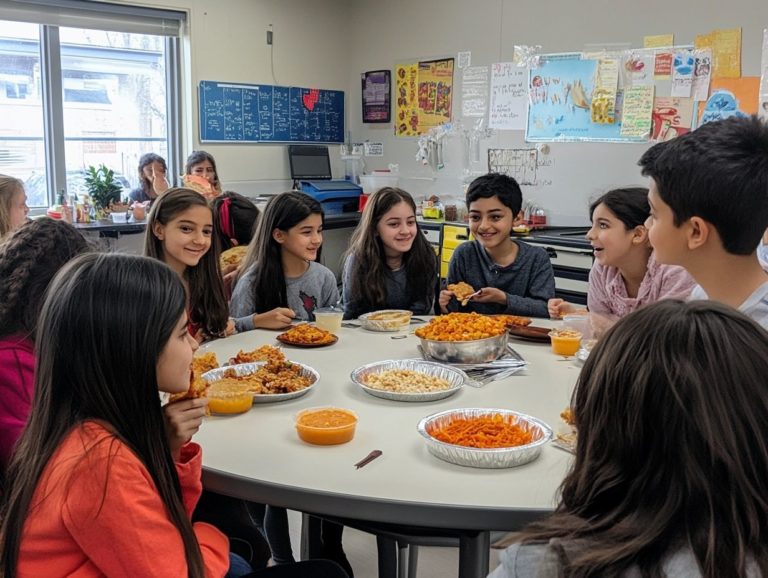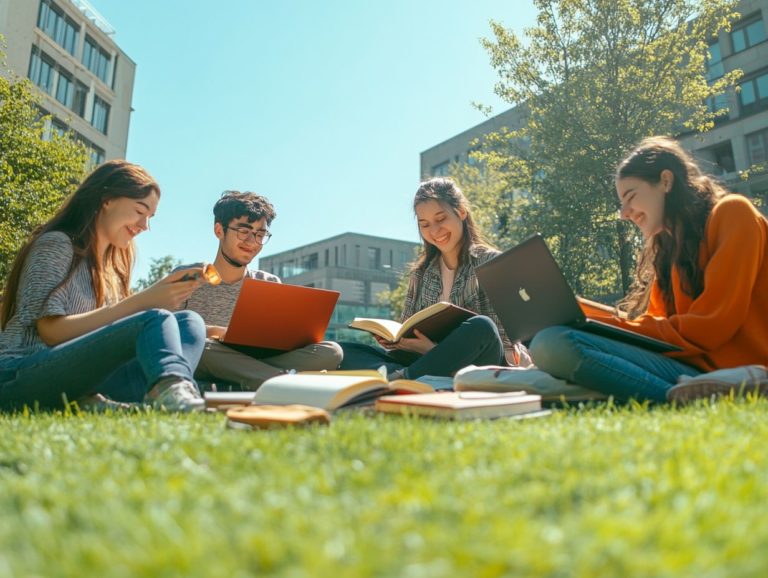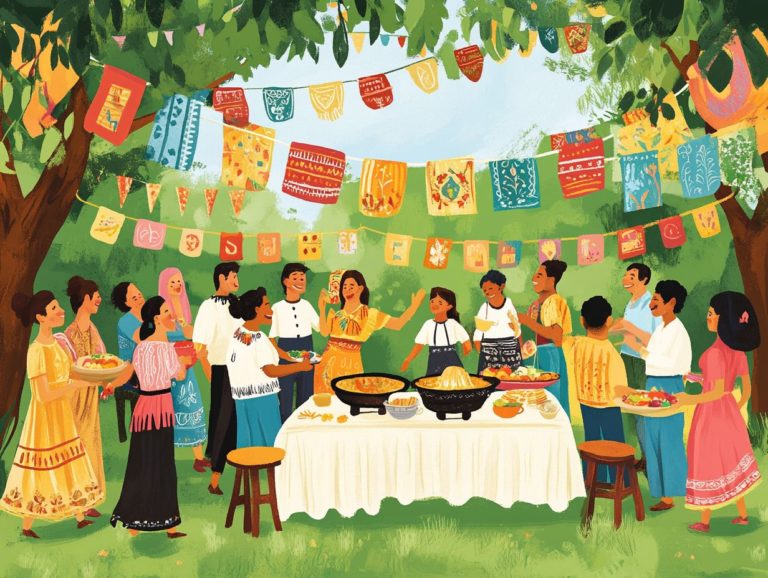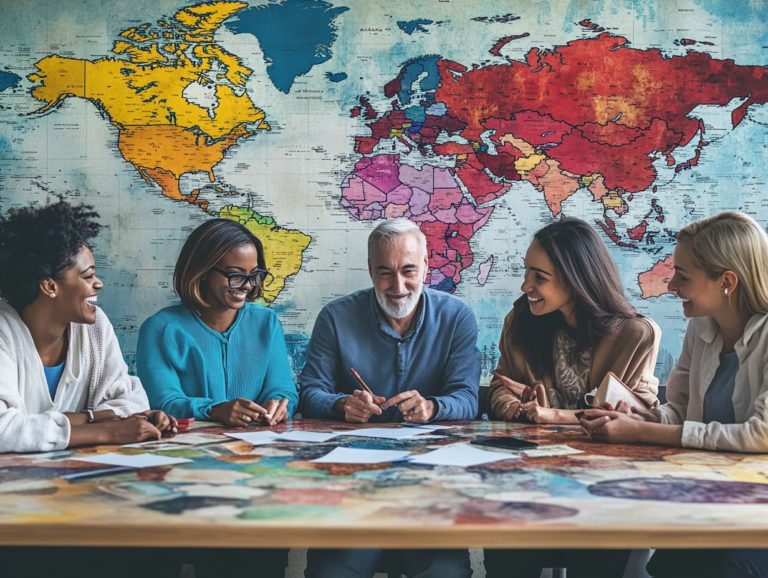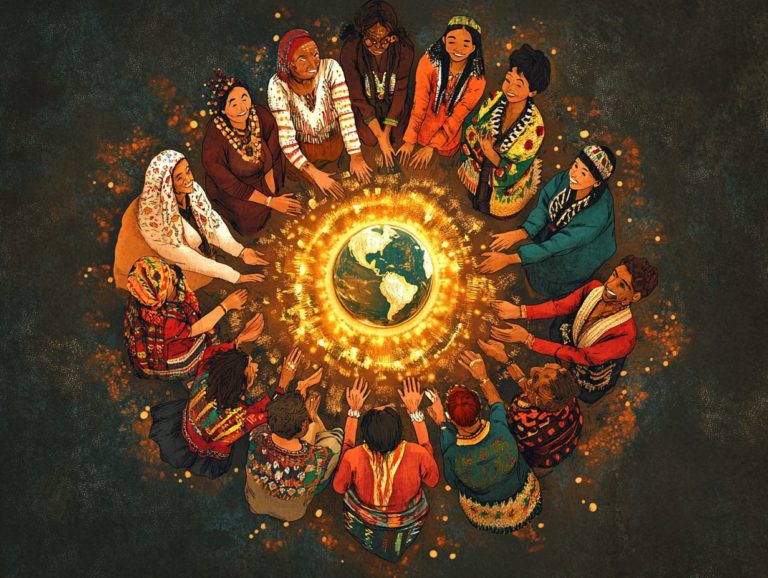5 Creative Ways to Share Your Culture Abroad
Sharing your culture abroad is not just enriching; it s a remarkable opportunity to build connections and foster understanding among diverse communities.
Here are five imaginative ways to showcase your heritage, whether through preparing traditional dishes or hosting lively cultural events:
- Prepare traditional dishes.
- Host lively cultural events.
- Engage in storytelling.
- Participate in local festivals.
- Share traditional arts and crafts.
This journey will reveal challenges and equip you with the tools to overcome them. We will explore respectful practices and ideas for continuing your cultural journey long after you ve returned home.
Start sharing your culture today, and watch as connections flourish!
Contents
- Key Takeaways:
- 1. Cook and Share Traditional Dishes
- 2. Host a Cultural Event or Celebration
- 3. Share Folklore and Stories
- 4. Teach Traditional Crafts or Skills
- 5. Participate in Local Cultural Activities
- How Can Sharing Your Culture Abroad Benefit You and Others?
- What Are the Challenges of Sharing Your Culture Abroad?
- How Can You Prepare to Share Your Culture Abroad?
- What Are Some Examples of Successful Cultural Exchanges?
- How Can You Be Respectful and Sensitive When Sharing Your Culture Abroad?
- What Are Some Ways to Continue Sharing Your Culture Even After Returning Home?
- Frequently Asked Questions
Key Takeaways:
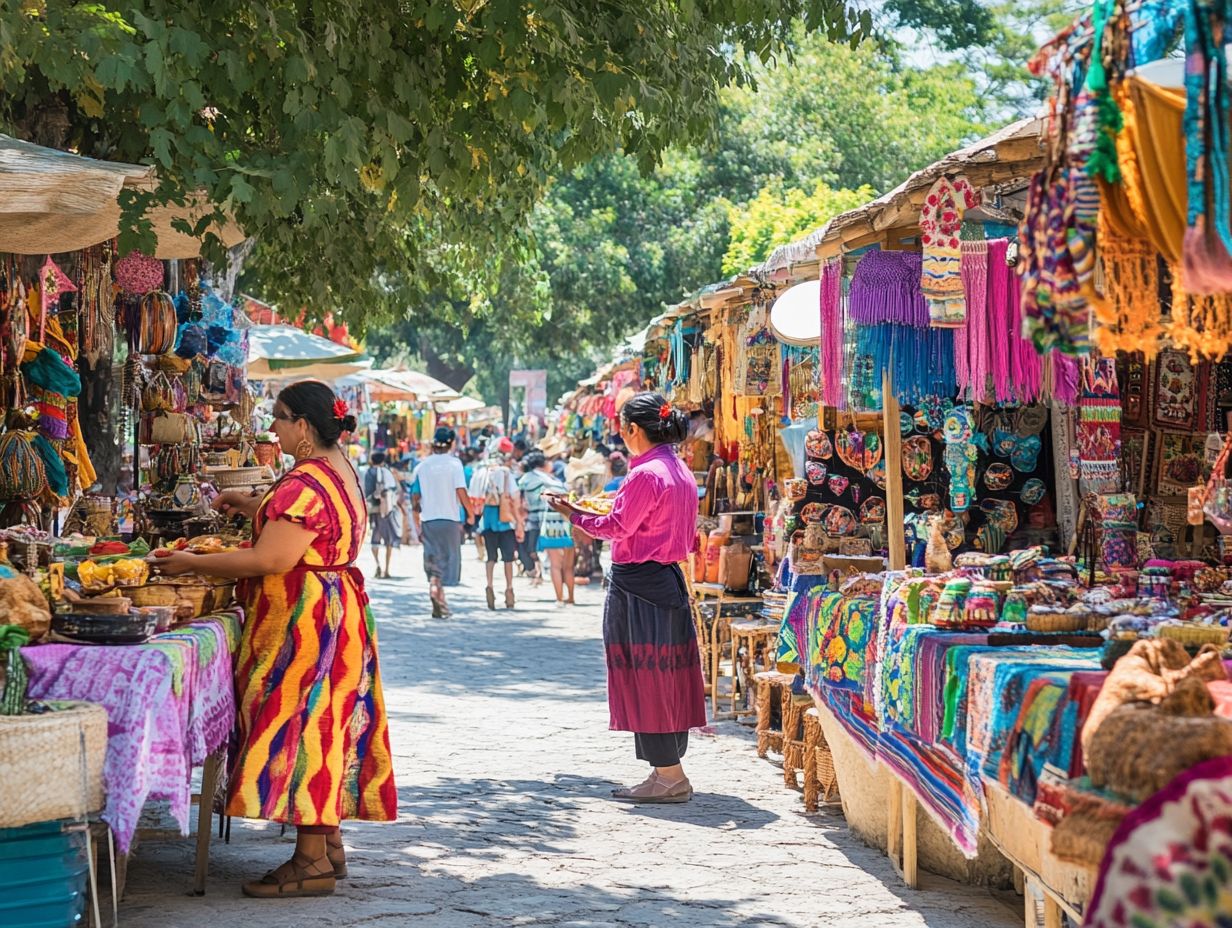
- Cooking and sharing traditional dishes can bring people from different cultures together and promote understanding and appreciation for your culture.
- Hosting a cultural event or celebration allows you to showcase your traditions, customs, and values to others, creating meaningful connections.
- Sharing folklore and stories not only educates others about your culture but also preserves and honors your heritage.
Cooking and sharing traditional dishes allows you to explore and celebrate your culinary heritage, which refers to the traditional cooking practices and recipes passed down through generations. It also fosters cultural exchange, which is the sharing of ideas, traditions, and customs between different cultures.
This helps international students and community members learn about local customs and cooking traditions, creating a rich tapestry of experiences that bridge gaps and promote understanding.
Imagine taking specific cooking classes that focus on global cuisines; they can truly transform how you view your surroundings. Consider Jake Roberts, who immersed himself in Korean culinary arts under the expert guidance of Mrs. Park. Her patience and expertise revealed to him the depth of flavors in dishes like kimchi and bulgogi, igniting his appreciation for Korean traditions.
These experiences remind you that food is often the heart of cultural identity, transcending boundaries and fostering empathy. By sharing the meals you learn in class, you not only preserve ancestral recipes but also spark conversations that strengthen community bonds, cultivating awareness about the rich stories behind each dish.
2. Host a Cultural Event or Celebration
Hosting a cultural event or celebration presents an invaluable opportunity to showcase your cultural traditions, help others learn about your culture, and create volunteer opportunities that enhance social service agencies’ involvement in promoting a company culture of diversity especially among international students.
These events can vary from vibrant holiday festivals that highlight specific cultural heritages to art exhibitions that engage local artists and celebrate community creativity. Each type offers a unique chance to connect with others over shared values, contributing to a sense of belonging and pride within the community.
To ensure your event’s success, prioritize careful planning. This includes securing permits, selecting accessible venues, and engaging local sponsors. Utilizing local media outlets can significantly raise awareness, as their coverage helps draw in attendees and encourages participation.
For example, a multicultural food festival invites residents to savor diverse cuisines and serves as a platform for meaningful dialogue between different cultural backgrounds, enriching everyone’s experience.
Sharing folklore and stories is a remarkable way for you to preserve cultural traditions and gain rich insights into diverse perspectives. It creates an inviting space where various groups can connect and foster community awareness through engaging discussions and cultural events.
Through storytelling, you can share personal experiences that highlight the unique challenges and triumphs of your heritage. This allows others to develop a deeper appreciation for different cultural backgrounds. For instance, indigenous storytelling, which shares traditional knowledge passed through generations, often weaves in lessons about nature and sustainability, making it incredibly relevant in today s environmental conversations.
By encouraging community gatherings or classroom activities where individuals can narrate their personal stories, you can help cultivate empathy and understanding among participants. Platforms such as storytelling festivals or local storytelling circles act as vibrant venues for these exchanges, enabling community members to discover shared values while celebrating their distinct narratives.
4. Teach Traditional Crafts or Skills
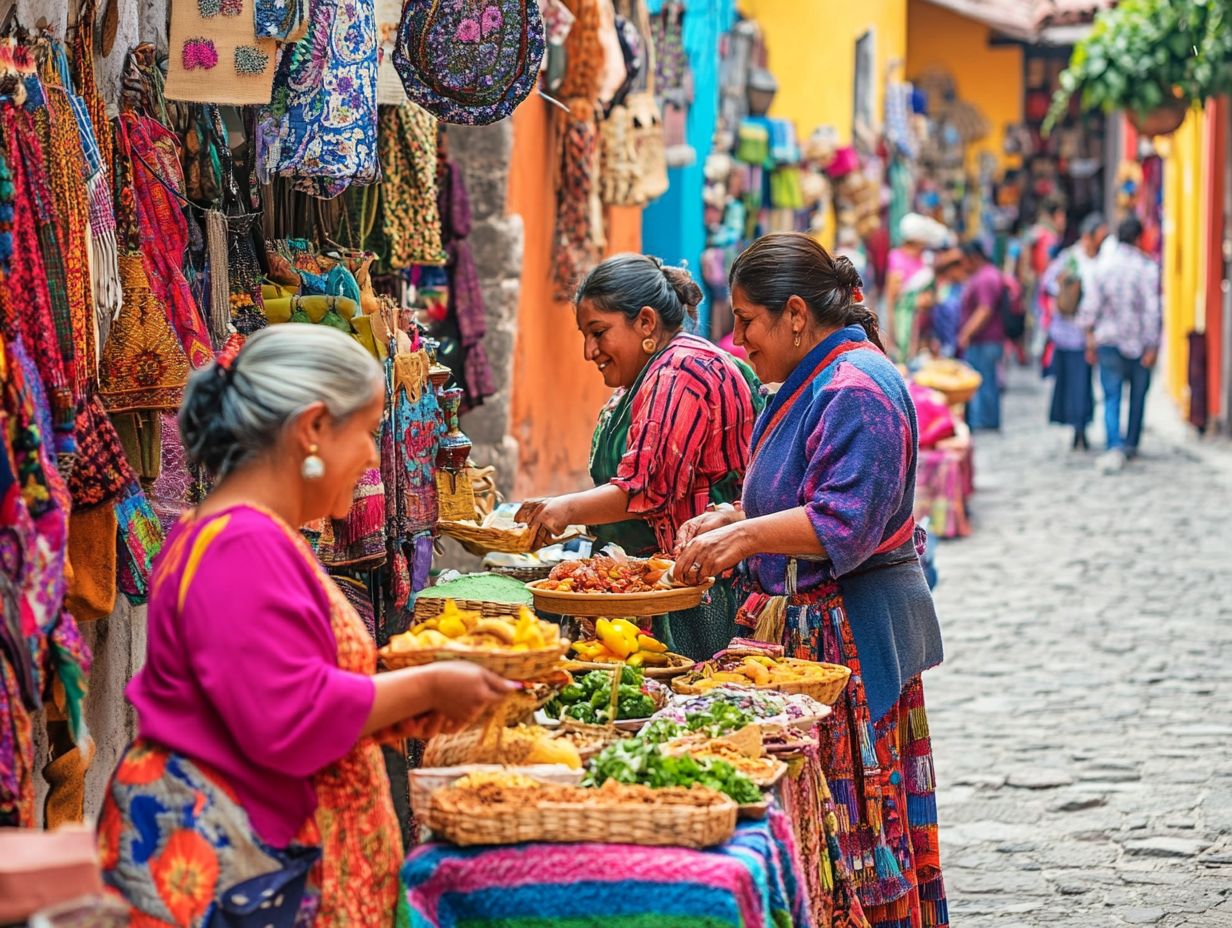
Teaching traditional crafts or skills is a powerful way for you to help preserve cultural heritage while offering participants a hands-on experience. This not only fosters cultural awareness but also encourages community groups to engage in volunteer work that promotes local customs and craftsmanship.
As you learn techniques like pottery, weaving, or traditional painting, you gain invaluable insights into the history and significance of these practices, deepening your appreciation for the culture they embody. Instructors often masters of their crafts share not only their skills but also personal stories, adding richness to the learning environment.
Consider organizing craft classes during cultural awareness days. This strategy attracts larger crowds and encourages community involvement, inviting local artisans to showcase their work. This collaborative atmosphere enhances participants skills and knowledge while instilling a sense of pride within the community as traditions are honored and passed down through generations.
5. Participate in Local Cultural Activities
Participating in local cultural activities offers you a rewarding opportunity to fully immerse yourself in your host culture. It s a chance to promote community involvement and establish meaningful connections with fellow international students through shared experiences and volunteer opportunities.
These activities can vary widely from traditional dance classes and cooking workshops to art exhibitions and vibrant community festivals. Each experience provides deep insights into local customs and everyday life.
Engaging in these opportunities not only enhances your empathetic understanding of diverse perspectives but also cultivates an environment for exchanging ideas, fostering lifelong friendships across cultures.
For instance, consider a recent community art project that united locals and newcomers to create a mural reflecting their shared stories and aspirations. Social service agencies often play a pivotal role in facilitating such interactions, organizing events that link volunteers with neighborhoods, thereby enriching the cultural tapestry for everyone involved.
How Can Sharing Your Culture Abroad Benefit You and Others?
Sharing your culture abroad brings invaluable benefits not just to you but also to the international community. It enhances cultural understanding, fosters empathy during travel, and builds communication skills that bridge gaps between diverse groups through personal stories and shared experiences.
Imagine an international student from Brazil introducing the vibrant tradition of Carnival to classmates at a foreign university. This sparks conversations that reveal both similarities and differences in celebration styles. Such exchanges broaden your peers’ perspectives while deepening the Brazilian student’s appreciation for their cultural roots.
Similarly, think about a student from Japan sharing the art of tea ceremonies. This opens exciting discussions about mindfulness and rituals across different traditions. These interactions promote personal growth, making you more adaptable and aware of the world around you. Ultimately, they strengthen community bonds and foster mutual respect among diverse groups.
So, get involved! Participate actively in cultural activities and share your experiences. Your presence can make a difference in building a more inclusive community.
What Are the Challenges of Sharing Your Culture Abroad?
Sharing your culture abroad can be a truly enriching experience, but it also comes with its fair share of challenges. You might find yourself navigating cultural differences, which are the various ways people from different backgrounds think and behave, and communication barriers that can impede genuine cultural awareness and appreciation of local customs.
These hurdles often show up in the form of language barriers. Subtle nuances and idioms can easily get lost in translation, leading to misinterpretations of your intentions and meanings. Preconceived notions about certain behaviors can further complicate matters, resulting in misunderstandings when showcasing traditional practices.
To tackle these obstacles, actively listening becomes essential. This ensures mutual understanding and keeps you open to learning about the local culture. Engaging in community activities can also help you build meaningful connections, offering firsthand experiences that deepen your comprehension and appreciation of diverse values and traditions.
Nurturing relationships through patience and empathy elevates your cultural exchange experience.
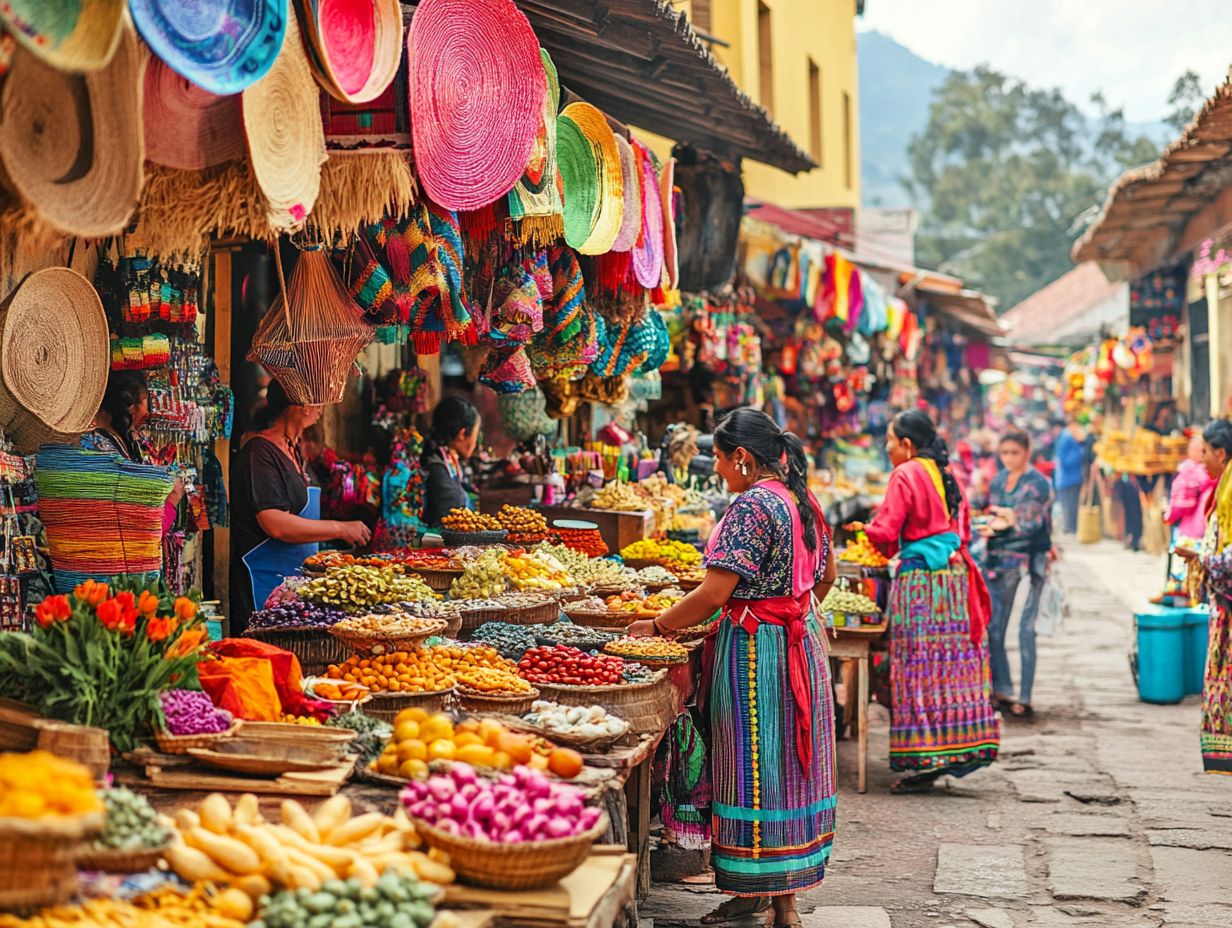
Preparing to share your culture abroad requires you to dive deep into thorough research about the local customs and cultural experiences of your destination. It s also crucial to sharpen your communication skills, enabling you to convey your cultural narratives effectively and foster genuine cultural awareness.
To truly immerse yourself and engage with the local community, you must grasp the understanding of local customs that may exist. This understanding paves the way for respectful interactions. Learning about taboos, etiquette, and even picking up a few basic phrases in the local language can significantly enhance your ability to connect with others.
Consider developing tailored communication strategies to reach diverse audiences, ensuring your message truly resonates. Utilize storytelling and relatable examples that reflect both your culture and that of the host community. This proactive approach not only enriches the cultural exchange but also builds bridges of understanding and appreciation between you and those you meet.
What Are Some Examples of Successful Cultural Exchanges?
Successful cultural exchanges, particularly through well-structured programs, offer you a unique opportunity to share your cultural traditions and personal stories. This fosters deeper connections and understanding between diverse communities.
Take the Fulbright Program, for example. It has allowed countless students, like you, to immerse themselves in various cultures while contributing your unique perspectives and experiences. Participants often recount how sharing traditional meals or local music not only builds friendships but also breaks down stereotypes.
Similarly, AFS Intercultural Programs encourage dialogue by hosting high school exchange students, enabling local families to learn directly about different lifestyles and values. These shared experiences enrich your life and help lay the groundwork for mutual respect, highlighting the vital role of empathy and cultural appreciation in our increasingly globalized world.
What cultural experiences have shaped your identity?
How Can You Be Respectful and Sensitive When Sharing Your Culture Abroad?
Being respectful and sensitive while sharing your culture abroad means cultivating a sense of cultural awareness and empathy in your travels. It’s essential to employ effective communication skills to honor local customs and promote mutual understanding.
Start your exciting journey by actively listening to local perspectives and experiences, as such engagement fosters deeper connections. Adapting to the cultural practices of your destination be it language, dining etiquette, or social norms demonstrates not only respect but also appreciation. Embracing feedback allows you to reflect on your behaviors and make necessary adjustments, reinforcing positive interactions.
Empathy is key in this process; it enables you to step into the shoes of others, enriching your travels while ensuring that local communities feel valued and understood.
What Are Some Ways to Continue Sharing Your Culture Even After Returning Home?
Continuing to share your culture after returning home is entirely within your reach, thanks to active community involvement, storytelling, and leveraging local media to preserve and promote your cultural traditions and personal narratives.
One highly effective approach is to organize cultural sharing events, where you can showcase your experiences through captivating performances, art, and delightful food. Exploring unique experiences for students traveling abroad can also enhance your understanding of different cultures.
Storytelling sessions can spark rich dialogues within your community, allowing locals to connect on a deeper level with diverse backgrounds.
Engaging with community groups can amplify your impact by encouraging collaboration on projects that highlight shared histories and traditions. By fostering these exchanges, you illuminate the richness of your experiences and enhance the overall cultural fabric of the area, making your community more vibrant and inclusive.
Frequently Asked Questions
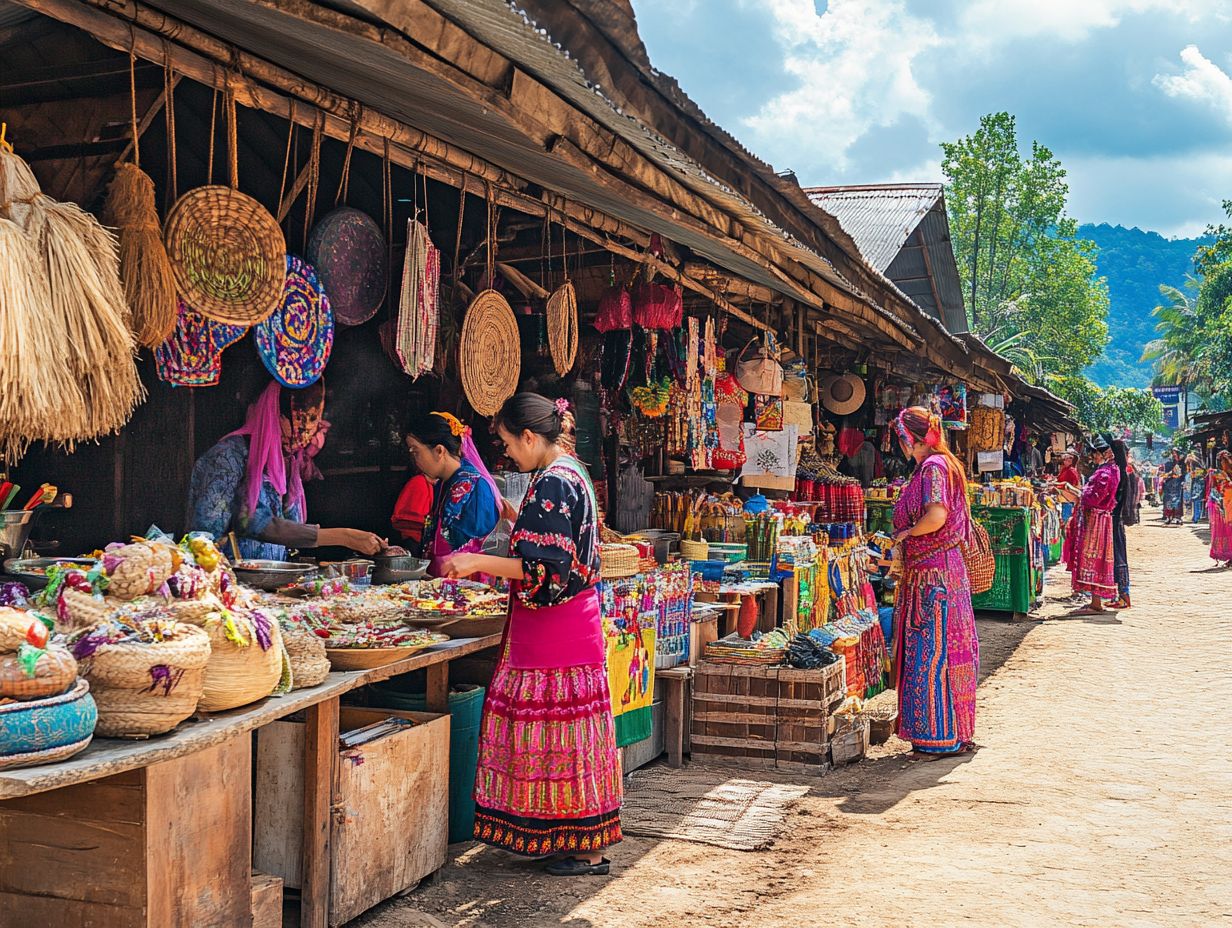
What are 5 creative ways to share your culture abroad?
- Host a cultural cooking class: share the flavors and recipes of your country in a fun and interactive way.
- Organize a cultural performance: whether it’s traditional dance, music, or storytelling, showcasing your culture through performance engages and educates others.
- Create a cultural exchange program: partner with a school or community organization to bring together individuals from different cultures for a day of learning and sharing.
- Participate in a cultural festival: many countries host cultural festivals where you can set up a booth, display traditional items, and share information about your culture.
- Collaborate with local businesses: partner with a restaurant, caf , or shop to promote your culture through their products or services.
Why is it important to share your culture abroad?
Sharing your culture abroad helps promote understanding and appreciation for different ways of life. By doing so, you can also explore 5 ways to enhance your cultural awareness, allowing for the preservation and celebration of cultural traditions and customs.
What are the benefits of sharing your culture abroad?
Sharing your culture brings amazing benefits! It promotes cultural diversity, fosters cross-cultural connections and learning, and dispels stereotypes and misconceptions.
How can I find opportunities to share my culture abroad?
You can find opportunities to celebrate your heritage abroad through networking, reaching out to local organizations or businesses, and participating in cultural events and festivals.
What are some tips for effectively sharing your culture abroad?
Some tips for effectively sharing your culture include being respectful and open-minded, providing context and background information, and actively engaging with your audience.
What can I do to make sure my cultural sharing is culturally sensitive?
To ensure cultural sensitivity when sharing your culture abroad, research and understand the cultural norms and values of the place you are visiting. Seek permission and guidance from local experts, and be mindful of potential cultural barriers and misunderstandings.
Ready to share your culture? Get involved, engage in conversations, and let your unique story shine!


